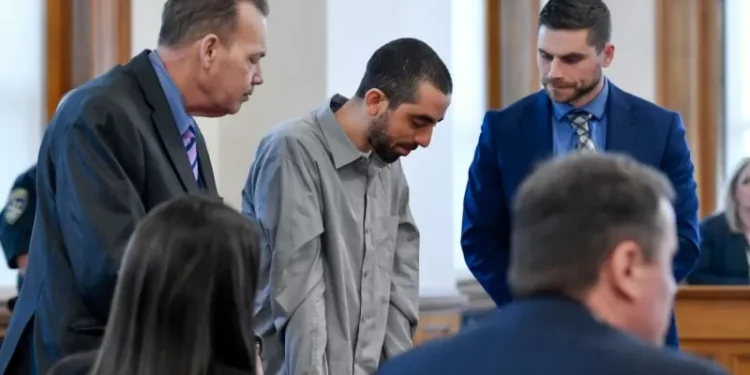Mayville, New York – In a shocking turn of events, a New Jersey man has been convicted of attempted murder for stabbing renowned author Salman Rushdie during a lecture at the Chautauqua Institution in 2022.
Hadi Matar, 27, was found guilty by a jury after less than two hours of deliberation. He was also convicted of assault for injuring another man who was on stage with Rushdie at the time of the attack.
The incident occurred on August 12, 2022, as Rushdie was about to give a speech at the renowned literary and cultural center. Matar, without any warning, stormed onto the stage and stabbed Rushdie multiple times in front of a live audience. The brutal attack left the 77-year-old novelist severely injured and blind in one eye.
During the seven days of testimony, Rushdie himself took the stand as the key witness, providing graphic details of his life-threatening injuries and the long and painful recovery process that followed.
As the verdict was announced, Matar showed no visible reaction from his seat at the defense table. But as he was led out of the courtroom in handcuffs, he quietly uttered, “Free Palestine,” echoing the same sentiments he had expressed while entering and leaving the trial.
Matar’s defense attorney, Nathaniel Barone, stated that although his client was disappointed by the verdict, he was well-prepared for it.
The District Attorney, Jason Schmidt, presented a slow-motion video of the attack during his closing argument, pointing out Matar as he made his way from the audience to the stage and launched his vicious assault on Rushdie.
Schmidt emphasized the unprovoked and targeted nature of the attack, stating that despite the presence of a large crowd, Matar had singled out Rushdie as his target.
On the other hand, Matar’s defense team argued that the prosecution had failed to prove his intention to kill Rushdie, which was crucial for an attempted murder conviction.
However, Schmidt countered this argument by stating that while it may not be possible to know what was going on in Matar’s mind, it was foreseeable that such a brutal and sustained attack would result in a fatality.
He further reminded the jury of the testimony from a trauma surgeon, who had stated that without prompt medical treatment, Rushdie’s injuries would have been fatal.
The prosecution also presented video evidence showing Matar approaching Rushdie from behind and repeatedly stabbing him in the torso while he struggled to defend himself. The footage also captured the chaos and panic among the audience as they witnessed the shocking incident unfold.
In addition to Rushdie, Matar also injured the founder of City of Asylum Pittsburgh, Henry Reese, who had been seated next to the author on stage. Reese sustained a gash to his forehead, leading to an assault charge against Matar.
As the trial concluded, the judge set the sentencing for April 23, and Matar could face up to 25 years in prison for his heinous crime.
The attack on Rushdie sent shockwaves through the literary community, with many expressing their outrage and support for the beloved author. Rushdie himself has been a target of violence and death threats since the publication of his controversial novel, “The Satanic Verses,” in 1989. Despite these challenges, he continues to be a vocal advocate for free speech and the safety of writers around the world.
The incident also highlighted the increasing threats and dangers faced by writers and intellectuals in today’s society. It serves as a grim reminder of the importance of protecting and upholding the freedom of expression, which is a fundamental right in any democratic society.
As we await the sentencing of Hadi Matar, let us stand in solidarity with Salman Rushdie and other writers who have been victims of such senseless acts of violence. Let us also strive to create a world where individuals can express their thoughts and ideas without fear of retribution, and where differences can be resolved through dialogue and discourse rather than violence.
The Chautauqua Institution, known for its commitment to intellectual and cultural exchange, has been a symbol of hope and progress since its inception in 1874. As we move forward from this tragic incident, let us not forget its message of harmony and understanding, and work towards a better and more tolerant world for all.










